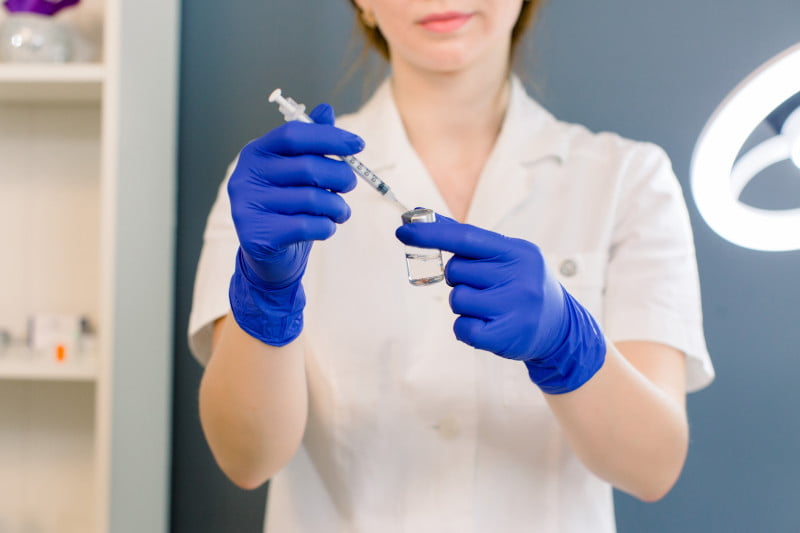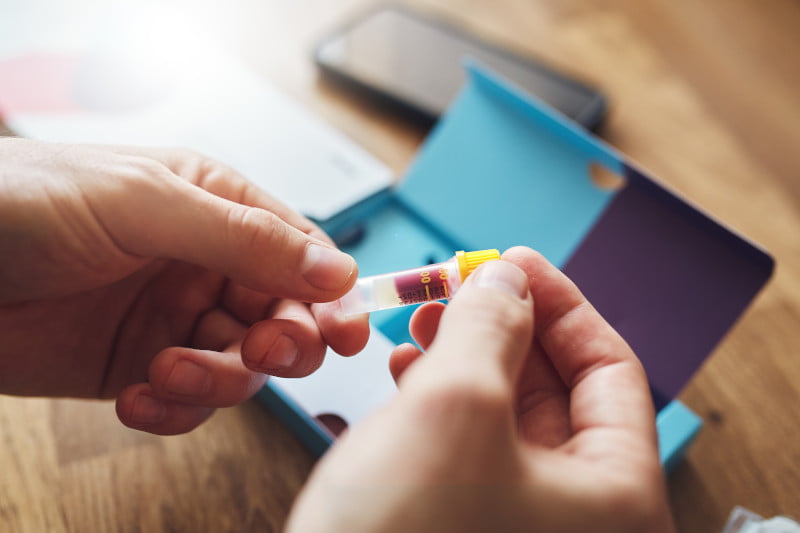Many people want to increase their T levels to improve their physique, confidence, energy, and performance.
However, when testosterone is taken without qualified medical supervision, it has been associated with undesirable side effects like roid rage, anger issues, and mood swings.
Is there a relationship here, or is roid rage more of a myth than anything else?
This article will reveal the effects of testosterone that causes these issues and the remedies for these effects.
What Is Testosterone, and What Is Its Function in the Body?
The primary male sex hormone is called testosterone. It is also found in women but in fewer amounts. These are "chemical messengers," stimulating cells to control the following:
- The male reproductive system
- Your libido
- Your "manly" features like facial hair, a deep voice, the development of the testes and penis, and the size of your muscles.


Men's T levels are closely related to their mood, energy, libido, facial and body hair, and muscle mass. And as they age, their T levels decline significantly.
These levels often drop to the point where further side effects manifest, which can then be treated with Testosterone Replacement Therapy or TRT.
Your fertility, weight, and temper can also be affected if T levels are either too low or too high.
NOTE: Testosterone replacement therapy (TRT) is known to improve the well-being and mood of men treated for hypogonadism (low testosterone levels). We'll discuss the side effects of TRT further below.
The Connection Between Testosterone and Mood: How Does Testosterone Affect Mood?
Although testosterone has historically been associated with violent behavior and rage, research shows that it is not always the case and will depend largely on specific scenarios or circumstances(1).
Genetics, the endocrine system, societal norms for men and women, and other variables could also be factors.


T, like other hormones, has the potential to influence mood, though it may not necessarily be the primary cause.
Although T impacts the brain, it can be challenging to determine how this hormone affects mood. Low T levels are more prevalent in males with mood disorders than in high test levels.
The notion that T can make you furious is not a sound argument at this point. Also, when your T level has been too low, TRT aids in restoring your mood to normal.
Does Testosterone Result in Anger?
Men who take anabolic steroids (synthetic T to increase muscle growth and sports performance) occasionally have violent behavior.
But does that mean that the rise of T is the actual cause of their violent behavior?


In a study(2), it was discovered that situationally-induced anger is indeed connected to a rise in testosterone.Therefore, while there is a connection between testosterone and anger, testosterone does NOT necessarily result in anger.
Rather, it's the other way around, and anger could result in the rise of testosterone.
Does Testosterone Have an Anxiety Effect?
The jury is still out on whether T increases anxiety — sex hormones like T impact brain structure and development during puberty.


Even though high and low test levels have been associated with depression(3), we can't conclude that T can give you anxiety.
And while depression and anxiety are two distinct disorders, they frequently coexist. So, if your low T makes you feel down, you might also notice an increase in your anxiety.
Is Irritability a Result of Testosterone?
General irritability might occur(3) from low T levels and similarly high cortisol levels.
Some doctors may advise testosterone therapy if your levels are persistently low to bring back test levels to a normal range.


It has been demonstrated that low tests cause a decline in mood and that medication will help.
Improving your general health is often the best way to feel better, regardless of whether you think there is such a thing as irritable male syndrome due to low test.
Practice healthy habits, such as good nutrition, exercise, maintaining a healthy weight, quitting smoking, and moderate drinking.
Benefits of Testosterone
Testosterone aids in strengthening men's:
- Heart and Blood: A healthy heart pumps blood to the rest of the body, supplying muscles and organs with the oxygen they need to operate at their peak performance. Through the bone marrow, T aids in the creation of red blood cells. Conversely, numerous cardiovascular hazards are associated with low levels of tests.
- More Muscle, Less Fat: T is responsible for increased muscle growth. Increased energy levels and weight control are benefits of a leaner body mass. Remedying low test males can help reduce body fat and increase the size and strength of their muscles.


- Stronger Bones: In terms of bone mineral density, T is essential. As men age and their T levels decline, their bone density decreases, increasing the risk of osteoporosis and brittle bones.
- Better Spatial Awareness, Verbal Memory, or Mathematical Reasoning: A study has shown that low concentrations of T levels in men are associated with higher incidences of dementia(4). Additionally, healthy testosterone levels strongly correlate with cognitive skills(5) like verbal memory and quicker processing speed.


- Improved Libido: T levels naturally increase in reaction to sexual excitement and activity. Men who have high testosterone levels typically engage in more sexual activity. For libido and normal erectile function, older men require high levels of T. But it's important to remember that other illnesses or medications may also contribute to erectile dysfunction.
- Better Mood: T levels have been observed(6) to have effects on one’s mood, behavior, and quality of life. Dejection, exhaustion, and aggression are signs of low T levels. However, this might only apply to males with testosterone deficiency (hypogonadism). Men whose bodies naturally lose T over time did not exhibit a rise in sadness. Different testosterone treatment methods may have other impacts on mood. These therapies may also work well as an antidepressant.
Are There Any Side Effects to Testosterone Therapy?
Anyone using hormone replacement therapy may encounter side effects, but they are typically prevented when qualified medical professionals oversee the medication.
Before starting hormone replacement therapy, licensed physicians fully disclose all potential side effects to patients, particularly those receiving TRT.


For example, patients need to consult their doctors if they experience anger or irritability, as these symptoms may suggest an estrogen imbalance.
Anyone who uses high-dose steroids or other performance-enhancing drugs without prescription risks suffering several adverse effects, including roid rage.
Few Tips on How to Deal With Aggression
Are you prepared to manage your rage? These suggestions are a good place to start:
- You should first speak with your endocrinologist if you are using TRT and find that your level of rage has grown. The specialist might lower your dosage or change your treatment.
- You can either express your anger in healthy ways (e.g., through hobbies like singing, dancing, painting, and exercising), repress it, or make an effort to regulate your conduct until you feel better.
- A medical professional should always be consulted if you suffer rage in addition to despair, anxiety, or other mental health problems so they can provide you with the appropriate therapy options.
- Exercise, anger management workshops, support groups, behavioral therapy, and other medical practices are different strategies for managing your anger levels.
Should You Refrain From Taking Testosterone?
TRT is administered in a medical context to some men and women with low test. Seeking medical attention is crucial and taking T without a doctor's supervision should be avoided.
However, if you do need TRT, you can need not worry that increasing your T would result in irrational rage and aggressive behavior.


Before beginning or continuing TRT, you should discuss your worries with your doctor. Ultimately, your money might be better spent on a gym membership or a healthy diet plan than hormones.
What Is the Most Effective Treatment?
Testosterone replacement therapy is widely available throughout the United States in a variety of preparations:
- Pellets: These are implanted under the skin of the upper hip or buttocks, and over a few months, they continuously deliver a dose of T into the body's soft tissues.
- Injections: Typically, T is injected into your muscle once or twice a week. With your doctor's guidance, you can perform this procedure at home.
- Patches: These are applied once daily to a fleshy area of the body and release a modest amount of T over 24 hours.
- Gels and Creams: For a daily dose of T, these topical drugs are applied to the skin of the upper arm or upper chest.
How to Test Your Testosterone Levels
A blood test is typically required to determine test levels. This is typically done in the morning when T levels are at their highest.
Afterward, samples are usually sent to a laboratory for analysis.


To verify the measurements, the test may occasionally be repeated. Your doctor might advise you to cease taking prescription medications that could lower your test levels before the test.
Your T levels may be artificially raised by using certain drugs, such as:
- Steroids (but test levels can fall rapidly after stopping them)
- Barbiturates
- Anticonvulsants
- Treatments with androgen or estrogen
- Several medications, including opiates, can also decrease your test levels.
Remember to inform your doctor if you are taking any of the medications above. You can consult a doctor to get the results confirmed if your test results are poor. They can then advise you about the best way to deal with your test levels.
If your levels are normal but you still see worrying symptoms, visiting your doctor is still a good idea since this could be a sign of something more serious.
Can You Enhance Your Mood With Testosterone Supplements?
Lower quality of life is connected(7) with low test levels. Depression, exhaustion, and aggressive behavior are also signs of low testosterone levels. However, this might only apply to males with hypogonadism.
Men whose bodies naturally lose T over time typically do not exhibit a rise in depression.
On the other hand, TRT may result in modest improvements in red blood cell count, bone density, and sexual function.
How Do They Work?
You'll go through physical, mental, and sexual changes when you use prescription T boosters.
It would include increased muscle size, physical strength, libido, ease of arousal, and a better mood.


Although most of these changes may be for the better, side effects are also possible.
Meanwhile, natural testosterone supplements are significantly safer and less likely to have harmful side effects. They have all-natural components that promote secure hormone production.
Frequently Asked Questions (FAQs)
Here are several frequently asked questions about T to help you understand it better:
Does Increased Testosterone Production Make You Moodier?
If it’s within the range of normal levels, then no. However, since testosterone helps regulate your mood, abnormally high or love t levels will have an impact on your mood.
Does Consuming Testosterone Pills Make You Angry and Affect Your Blood Pressure and Performance?
T may raise blood pressure, increasing your risk of a potentially fatal heart attack or stroke. However, testosterone does not directly cause mood swings or violent "roid rage." Always consult your doctor if you have high blood pressure, or heart conditions, and have had a heart attack or a stroke.
What Is the Leading Cause of Low T?
The following conditions may cause low test: illness or damage to the testicles, cancer therapies such as chemotherapy or radiation, disease of the pituitary gland or other hormonal issues, other substances, such as opiate painkillers and corticosteroids, hereditary disorders like the Klinefelter syndrome, and alcohol and drug abuse.
Why Would You Want More Testosterone?
Having sufficient amounts of testosterone can lead to benefits such as increased energy, strength, libido, and a better mood. If you are an athlete, a serious gym-goer, or an older male looking to regain some vitality, increasing your T to healthy levels is worth a shot.
What Can You Do if You Have Low Testosterone and Mood Swings?
Testosterone replacement therapy is an effective remedy for abnormally low test levels. Your body's T supply is restored during therapy, ensuring optimal levels of the hormone that regulates mood and restoring equilibrium to your mental health.
Can Testosterone Cause a Lack of Motivation and Sex Drive?
In the body, testosterone works hard to maintain everything from muscle mass and bone density to sex drive. Reduced libido, increased body fat, decreased motivation, and sleep issues, including insomnia, can all be caused by a severe drop in testosterone levels.
Conclusion: Does Testosterone Make You Angry?
Your testosterone levels are not directly connected to your mood, and they’re definitely not the main cause of anger.
There are several factors that come into play, like drug abuse, bad relationships, over-competitiveness, and other stressful situations that can affect one's mood and irritability.
People with problematic anger can foster more positive interactions and relationships by recognizing the triggers that cause these emotions.
Whatever the root of your rage, talking to a doctor or a counselor can help you deal with it.
- Muñoz-Reyes, J A et al. “The Male Warrior Hypothesis: Testosterone-related Cooperation and Aggression in the Context of Intergroup Conflict.” Scientific reports vol. 10,1 375. 15 Jan. 2020, doi:10.1038/s41598-019-57259-0↩
- Peterson, Carly K, and Eddie Harmon-Jones. “Anger and testosterone: evidence that situationally-induced anger relates to situationally-induced testosterone.” Emotion (Washington, D.C.) vol. 12,5 (2012): 899-902. doi:10.1037/a0025300↩
- Johnson, Justin M et al. “The effect of testosterone levels on mood in men: a review.” Psychosomatics vol. 54,6 (2013): 509-14. doi:10.1016/j.psym.2013.06.018↩↩
- Marriott, Ross J et al. “Lower serum testosterone concentrations are associated with a higher incidence of dementia in men: The UK Biobank prospective cohort study.” Alzheimer's & dementia : the journal of the Alzheimer's Association vol. 18,10 (2022): 1907-1918. doi:10.1002/alz.12529↩
- Beauchet, Olivier. “Testosterone and cognitive function: current clinical evidence of a relationship.” European journal of endocrinology vol. 155,6 (2006): 773-81. doi:10.1530/eje.1.02306↩
- Zitzmann, Michael. “Testosterone, mood, behaviour and quality of life.” Andrology vol. 8,6 (2020): 1598-1605. doi:10.1111/andr.12867↩
- Moncada, Ignacio. “Testosterone and men's quality of life.” The aging male : the official journal of the International Society for the Study of the Aging Male vol. 9,4 (2006): 189-93. doi:10.1080/13685530601003180↩
